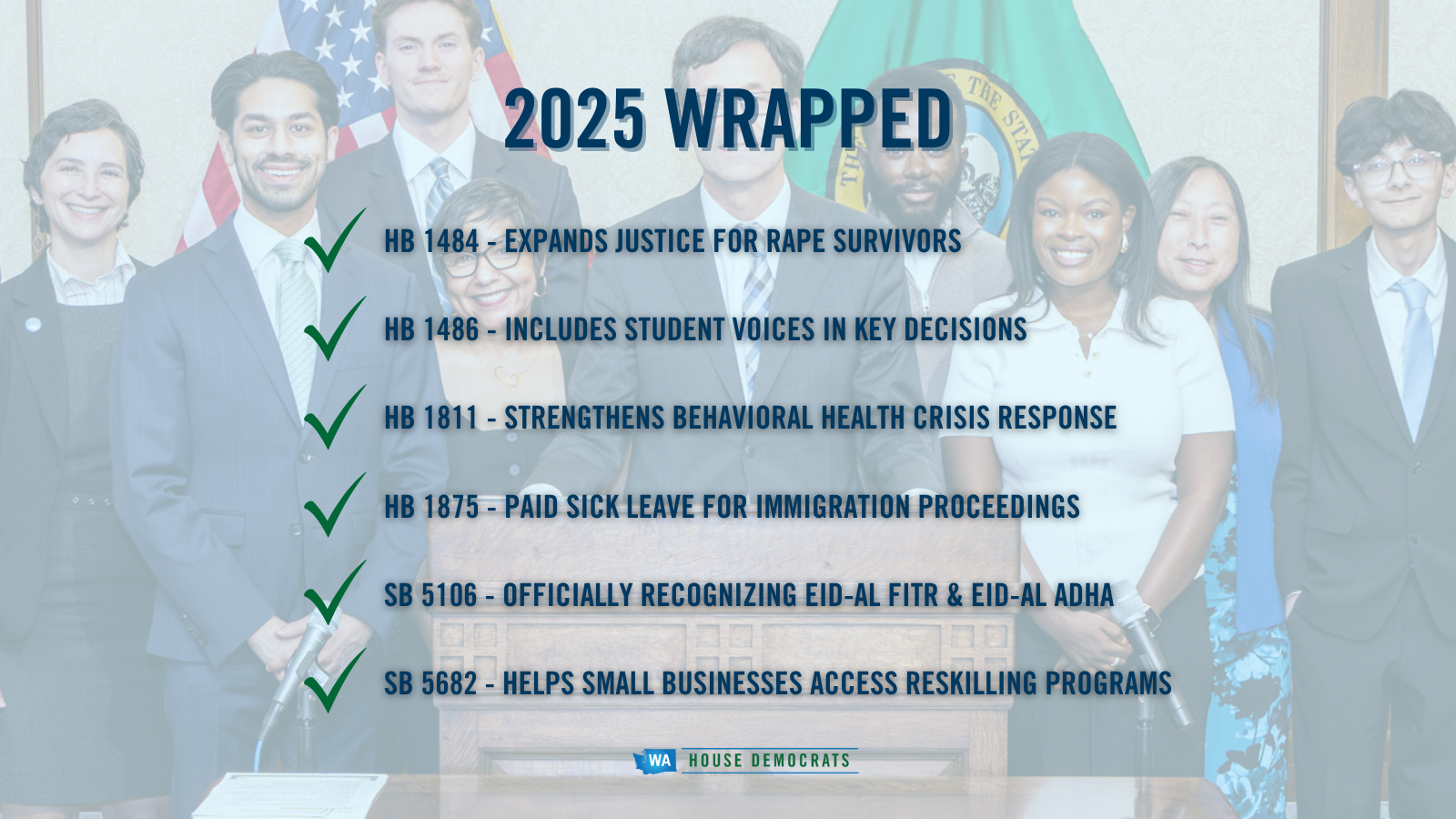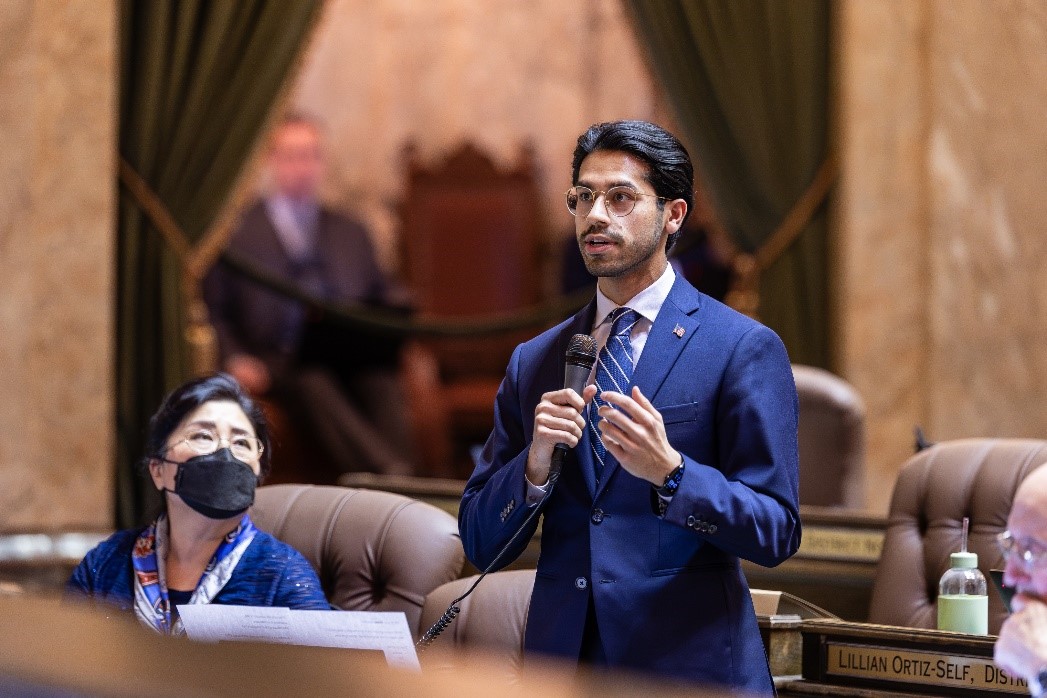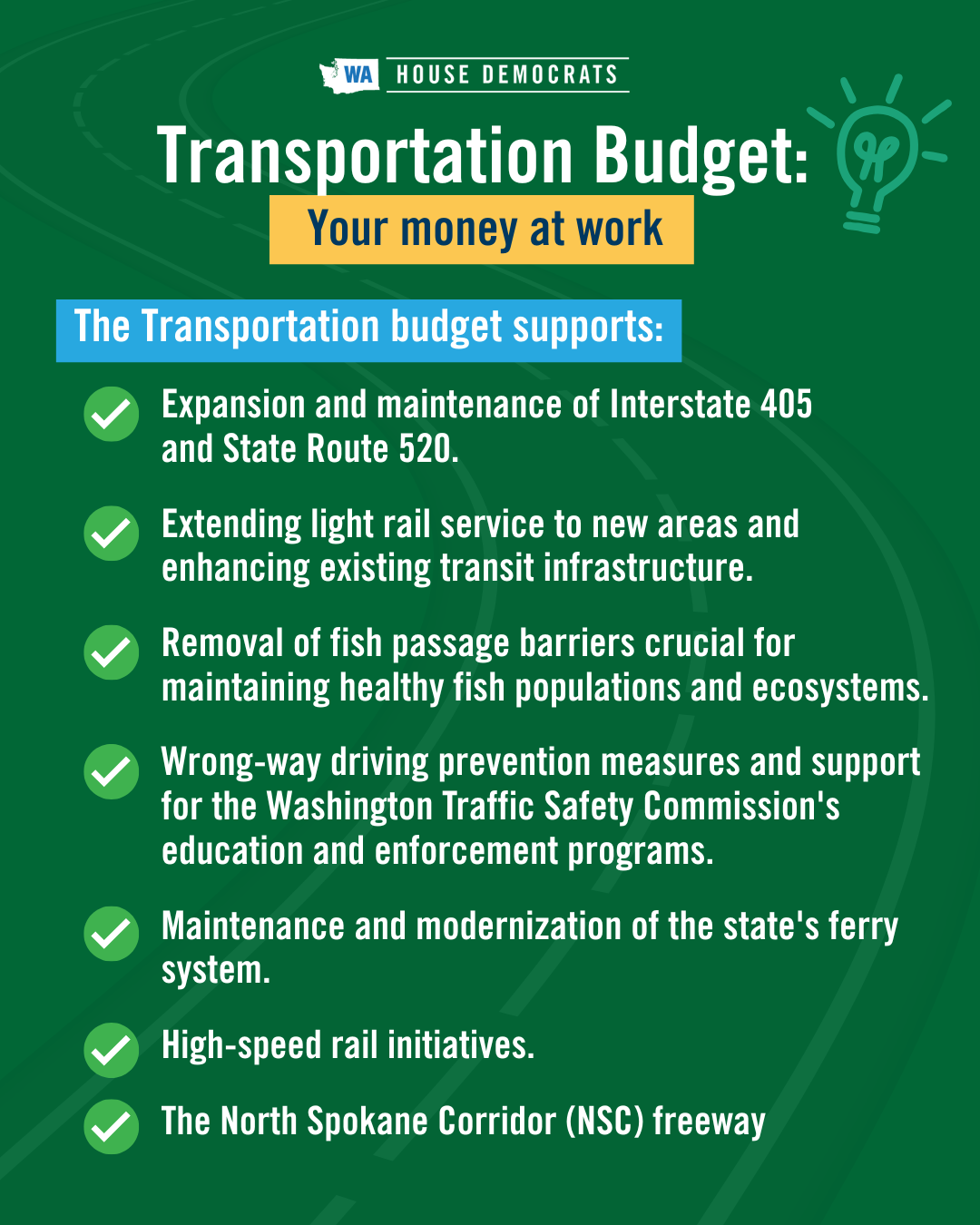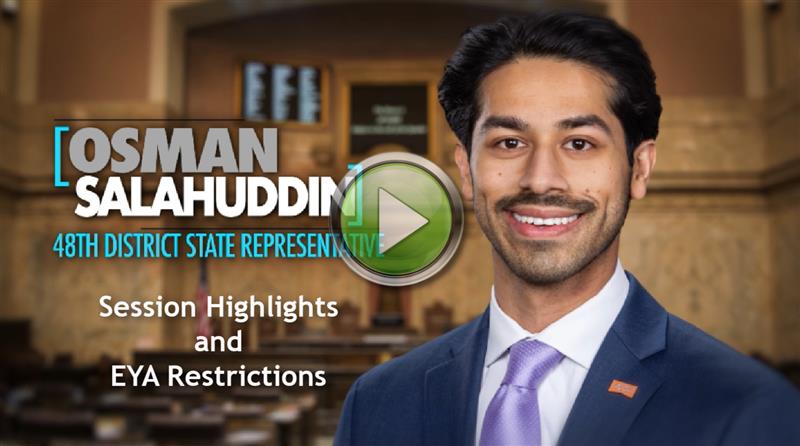Dear Neighbors,
The 2025 legislative session adjourned on April 27th, and I’d like to thank you for staying engaged! I also wanted to take this opportunity to reflect on the significant work accomplished over the last 105 days. We faced a serious budget shortfall, but we worked together to pass meaningful revenue solutions, send six of my bills to the Governor for signature, and pass responsible operating, transportation, and capital budgets that deliver essential services and programs to our community.

Before we dive into the details, I’d like to personally invite you to join me for upcoming events this Sunday, May 4th! This is a chance for us to meet face-to-face at various local coffee shops in our district, review the outcomes of the legislative session, and discuss your thoughts and priorities for our community.
Responsible Revenue and Cuts
This session, we took bold and crucial steps to reform Washington’s outdated tax code, while also addressing the pressing budget shortfall. From the outset, we knew we had to protect vital services — like education, housing, and healthcare — and that required rebalancing how we raise and distribute revenue across the state.
One of the most significant reforms we passed was HB 2015, which reimagines how we invest in public safety, enabling cities and counties to make real progress in keeping their communities safe. Additionally, we worked to strengthen public schools with HB 2049, allowing local communities to better support their students by updating how we calculate state funding.
We also passed SB 5794, which eliminated outdated tax exemptions that no longer served the public good — redirecting that revenue toward programs that help keep people housed, healthy, and fed. Alongside these major revenue reforms, we passed targeted policies to make our tax code clearer, fairer, and more responsive to the needs of Washingtonians.
Importantly, we paired these reforms with smart and strategic spending cuts — avoiding harmful cuts to core services. For example, during the emergency response to the COVID-19 pandemic, the Department of Health leased a warehouse to store critical supplies. That lease is no longer necessary. Ending it will save $4.4 million over four years — just one example of how we’re making responsible choices to reduce waste without jeopardizing essential programs.
This session marks a meaningful step toward long-term tax reform. Not only did we resolve immediate budget challenges, but we also laid the groundwork for a more equitable, sustainable future where all Washingtonians can thrive. My focus will remain on making our tax code fairer and more sustainable without increasing everyday costs on things families rely on — like healthcare, fuel, or groceries, or driving jobs away from our district.

Critical Investments in Our Community
The 2025-2027 biennial operating budget was centered on harm reduction and protecting Washington families from the worst effects of a $15 billion budget deficit. We faced rising costs, unpredictable federal policy changes, and declining revenues. However, we chose a different path than the all-cuts approach that would have devastated essential services. Instead, we made tough, values-based decisions, prioritizing food, shelter, and healthcare.
We maintained funding for public schools, ensured support for housing and homelessness programs, and avoided cuts to state workers, upholding collective bargaining agreements and preventing furloughs. While some program expansions were delayed, we still managed to increase funding for behavioral health beds and critical health programs like Apple Health for Immigrants and Cascade Care. We also passed SB 5263, which focused on increasing our state’s investment in special education, a priority that I had coming into session.
We preserved food assistance and expanded support for immigrants, refugees, and youth. We also ensured that higher education students would see no tuition increases. Housing stability remained a central priority, as we worked to sustain essential services and ensure that Washingtonians have access to the support they need to thrive.
At the local level, I worked to secure funding for impactful community-based projects across the 48th Legislative District. Notable investments include $769,000 for a new childcare facility in downtown Redmond, which will create 96 new childcare slots. The Muslim Association of Puget Sound will receive $2.5 million to expand its facilities and better serve the Eastside’s diverse community needs. Additionally, we secured $250,000 for the Bellevue Family YMCA redevelopment project, which will include affordable housing, and another $250,000 for Bellevue Downtown Integration Services.
We also made investments in recreation and youth development, including $1.2 million for the Marymoor Park Cricket Facility, $500,000 for playground and court upgrades at Southeast Redmond Park, and $515,000 for renovations and ADA improvements at Peter Kirk Pool. The Redmond Intercultural City Services Center received $636,000 to enhance civic and cultural engagement for our diverse residents. Additional investments include $74,000 for Eastside Terrace Club kitchen renovations and $27,000 for expanding teen workforce development programs. These projects aim to improve quality of life across our district and build a more inclusive and vibrant Eastside for everyone.
Transportation Investments

The 2025-27 transportation budget provides $31.2 million in new funding for projects exclusively within the 48th Legislative District, adding to the $125.6 million already invested in prior biennia. These investments focus on critical transit, bike, and pedestrian infrastructure improvements across Bellevue, Kirkland, and Redmond.
Key allocations include funding for the I-405/NE 85th Street Interchange Toll Infrastructure project, a major regional project aimed at reducing congestion and improving accessibility. Additionally, $4.2 million is also earmarked for continued design and right-of-way acquisition for the SR 520/124th Street Interchange, enhancing connectivity and safety.
Eastside communities will also benefit from funding for Overlake Area Bicycle and Pedestrian Improvements. Additionally, $1 million is allocated for transit queue jumps along 108th Ave NE in Kirkland, improving travel times for buses and commuters. The Bike Share Expansion across Kirkland, Bellevue, and Redmond will further promote sustainable, active transportation options. These investments collectively advance our community’s goals for safer, more efficient, and climate-resilient transportation systems.
Stay In Touch
As we head into the 2025 legislative interim, I want to let you know about a few important changes to my communication channels. Between May 5th and the certification of the 2025 election results, there will be a temporary freeze on most communication through my legislative website and Facebook. During this time, I will not be posting any new content with state resources, including email updates. However, I remain fully committed to serving you and our community, and my office will still be available to assist with any legislative inquiries, connecting you with state agencies, or scheduling meetings.
Despite restrictions on public communication, I am dedicated to continuing our dialogue and working together to address the issues that matter most to you. For more information about election year communication restrictions, please click here or watch the video above.
Thank you for your understanding and continued partnership as we work together to improve the 48th Legislative District.
In Service,

Representative Osman Salahuddin
48th Legislative District


